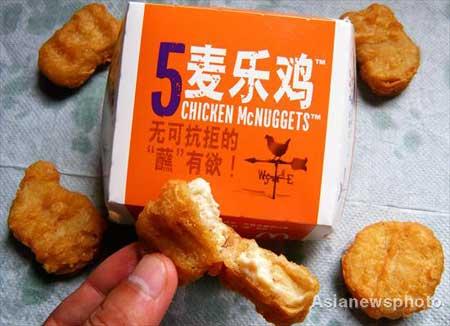
Media reports home and abroad said that the McNuggets contain preservatives made from tertiary butylhydroquinone (tBHQ), a petroleum-based product, and dimethylpolysiloxane. [Asianewsphoto]
McDonald's China said Thursday that the company is "actively cooperating" with China's food safety authorities in an investigation of its Chicken McNuggets for possible harmful additives, the 21st Century Business Herald reported.
Media reports home and abroad said that the McNuggets contain preservatives made from tertiary butylhydroquinone (tBHQ), a petroleum-based product, and dimethylpolysiloxane (the most common form of silicon and an anti-foaming agent).
On Tuesday morning, China's State Food and Drug Administration convened an expert panel meeting on McNuggets, and said in a statement posted on its website later that it is conducting a joint investigation with relevant authorities on the product in question.
Administration spokesperson Yan Jiangying said authorities do not expect test results within the week, adding that authorities will publicize results at the earliest possible time once they are available, the newspaper reported.
An insider with McDonald's China said the company can't provide more detailed information about the purchasing channels for the two additives and the upper limits of their usage, saying the company is waiting for the official test results, the report said.
The source added that more than 95 percent of the raw materials the company uses for their products were collectively purchased in China, and that their purchase and usage are subject to a decades-old control standard.
The above two chemicals are allowed to be used in food production procedures in China under a certain threshold. The maximum amount of tBHQ allowed in fried food is 0.2 grams per kilogram, and the amount of dimethylpolysiloxane can reach 10 mg per kilogram in edible fat, and 0.2 grams per kilogram in meat processing.
However, the newspaper found many loopholes, as well as a lack of awareness about the proper use of food additives and supervision in the country's food processing industry, which may pose threats to people's health, according to the report.





